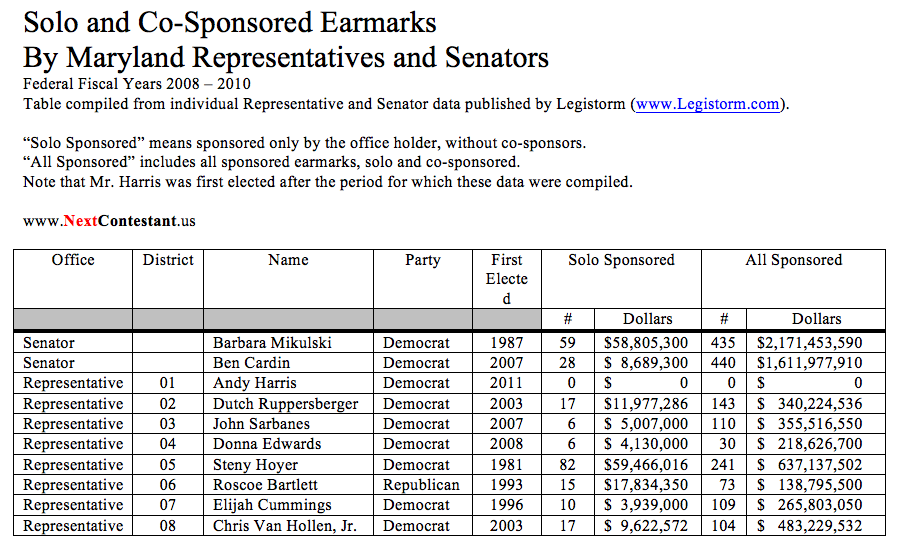 Sunday, June 10, 2012
Sunday, June 10, 2012
We elect our Congressmen/women and Senators to represent us when they legislate in the national interest. Unfortunately, that’s not all they do. A good deal of their time, and a great deal of our money is spent devising “earmarks” to benefit us locally. Not incidentally, these dollars legislators get for local causes improve their prospects for re-election.
According to Rob Portman, then Director of the Administration’s Office of Management and Budget, writing in a “Memorandum for the Heads of Departments and Agencies” dated January 25, 2007,
Earmarks are funds provided by the Congress for projects or programs where the congressional direction (in bill or report language) circumvents the merit-based or competitive allocation process, or specifies the location or recipient, or otherwise curtails the ability of the Administration to control critical aspects of the funds allocation process.
The bolding and underlining here and below, in the next quote, are mine.
Earmarks are supplementary appropriations (allocations of money) that are attached to legislation, but which are not otherwise related to and/or part of that legislation. In effect, the sponsoring legislators in the House and Senate are saying, “I’ll vote for this bill but, as a condition of my support, a certain amount of money is going to the Congressional district” or state “that elected me.”
It’s not that these earmarked expenditures are useless. Many are for important purposes and have significant, beneficial impact on the local communities to which they are directed. Many are not. The problem with earmarks is that they’re a legal form of extortion that, as Mr. Portman explained, “circumvents the merit-based or competitive allocation process, or specifies the location or recipient, or otherwise curtails the ability of the Administration to control critical aspects of the funds allocation process.” That was worth repeating. However locally helpful some of these earmarks might be, the process is still wrong and hurtful to other, more important causes. Robin Hood may have been a good guy, but he was still a thief.
The extortion aspect of earmarks aside, shouldn’t local voters be appreciative for the money anyway? No. We’re better, less selfish than that. Were the earmarks the best use of those funds, funds we don’t have without taking our country further into debt? And without due process? Do you really want this ill-begotten money in Maryland or your Congressional district if we have to borrow it from China for our children and our children’s children to pay back with income taxes better spent elsewhere?
According to no less an authority than President Obama, in remarks made November 14, 2010,
But as we work to reform our budget, Congress should also put some skin in the game. I agree with those Republican and Democratic members of Congress who’ve recently said that in these challenging days, we can’t afford what are called earmarks. These are items inserted into spending bills by members of Congress without adequate review.
Unfortunately, in these same remarks, the President, who is also running for re-election, announced that his solution to the earmarks problem was increased transparency. He hasn’t led an effort to outlaw earmarks, but has made it easier for us to find out who’s requesting what. (That helps, but I know leadership when I see it, and this isn’t it.)
In case you’re wondering, Maryland’s Representatives and Senators have not exactly taken the pledge when it comes to earmarks. Take a look at the table below which describes earmark activity for just federal fiscal years 2008 through 2010, compiled by Legistorm. The table shows dollar amounts associated with earmarks sponsored by the specific Senator or Representative acting alone, and then in co-sponsorship with other legislators. Both Maryland Senators and all eight Maryland Congressmen/women are included. The co-sponsorships are overlapping in that it’s common for one Representative or Senator to co-sponsor an earmark with another from his or her state.
What’s my point? The point is that earmarks are a subversion of the legislative and budgetary process that have got to stop. It’s another, costly example of the “business as usual” we need to change. We either vote out the incumbents who have perpetuated this system or stop complaining about ineffective government. That’s your choice, plain and simple.
Voters need to hold the incumbents responsible for the performance of our government while they are in office, and give a qualified replacement, regardless of his or her party affiliation, a fresh mandate to do it right. Our government isn’t working. It’s incumbent upon us, pun intended, to fix it. That’s what elections are for.
For Maryland’s and our country’s sake, stop re-electing incumbents just because you know their names or share the same party affiliation.
-Next Contestant

